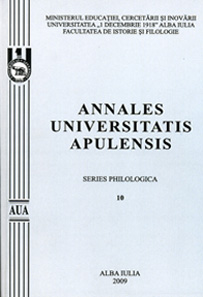EUGEN IONESCU DESPRE TRAGIC ŞI GROTESC ÎN VIAŢA LUI VICTOR HUGO
EUGEN IONESCU ABOUT TRAGIC AND GROTESQUE IN VICTOR HUGO'S LIFE
Author(s): Adina CurtaSubject(s): Literary Texts
Published by: Universitatea »1 Decembrie 1918« Alba Iulia
Keywords: demystifying; perverted meaning; self-comment; tragic; grotesque
Summary/Abstract: : The present paper deals with an early text written by Eugen Ionescu, “Viaţa grotescă şi tragică a lui Victor Hugo” (Victor Hugo’s grotesque and tragic life). Written in the same vain as his first book, “NU”, the text on Victor Hugo is intended to be a demystification of the French romantic poet’s life and works. The paper comprises two parts, i.e. “La început (n-)a fost titlul..” (In the beginning was (not) the Title) and “Între demistificare şi răstălmăcire prin întâmplări” (Between demystification and perverted meaning). The joining of the two adjectives grotesque and tragic in the context of a famous character’s life seems paradoxical initially. Later on, it acquires a personal logic which does not deny the iconoclastic Eugen Ionescu. True to himself, he preserves in the analysed text the same spirit which brought him the award for the debut volume Nu. Unlike other writers who give their works significant titles directly connected to the content, Eugen Ionescu either strays from this method altogether, or surprises by joining words which apparently exclude each other. In the present case we are dealing with a well elaborated “theses” which the title puts forward, namely of the fact that the great French romantic poet had a grotesque and tragic life. The extinction of these qualifying adjectives over the work will logically confirm the strong relation between life and work, so that no only the man, but also the poet, the husband, the lover and the political man is demystified. Eugen Ionescu uses the word “happenings” to name what he told in minute detail, in a tone specific to a realistic record whose elements are sustained by testimonies from several contemporary personalities. Moreover, the author includes himself in the text as well, with the same aim of increasing the verisimilitude of what he says, as he did in his previous volume. The demystification through the recourse to the grotesque dimension, existing or invented – which is irrelevant in the case of literature – is an exercise that becomes Eugen Ionescu perfectly. It is the happy discovery of a genuinely innate calling, and not artificially construed. We find out from Eugen Ionescu how the grotesque and the tragic can co-exist in the life of the same character. The grotesque and tragic life of Victor Hugo is first and foremost the tragic and grotesque fate of his literary creation. When he speaks about grotesque and tragic in Victor Hugo’s life, but the grotesque and the tragic will definitely be those imagined by him, and not illustrations of the academic dictionary definitions. Through the text „Viaţa grotescă şi tragică a lui Victor Hugo” (Victor Hugo’s grotesque and tragic life), Eugen Ionescu communicates a sentence that he gives following a critical overview placed at a certain height and distance in time of a “value” imposed by a certain historical moment: he doesn’t like Victor Hugo. The shocking effect that the text Viaţa grotescă şi tragică a lui Victor Hugo” (V. Hugo
Journal: Annales Universitatis Apulensis. Series Philologica
- Issue Year: 11/2010
- Issue No: 4
- Page Range: 69-82
- Page Count: 14
- Language: Romanian

